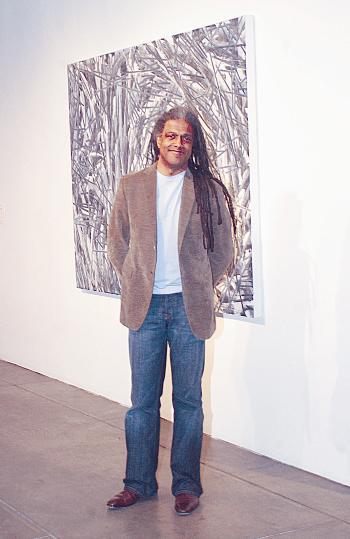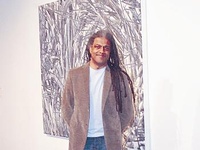Elvis Mitchell likes to disarm. Even in person, the same arresting wit he unleashes on readers and fearful filmmakers in his New York Times reviews arrives untrammeled.
“Am I keeping you up?” he quizzes me minutes after sitting down at the Carpenter Center’s Sert Gallery café. “You look like you’re dozing off. I can get you a cup of coffee.”
Actually, there’s no real danger of nodding off around Mitchell, who is at once relaxed, mock-confrontational and boisterously intellectual. His latest incarnation this semester as Visiting Lecturer in Visual and Environmental Studies (VES) and African and African American Studies—during which he’s keeping up his New York Times gig—hasn’t tamed him a bit.
In conversation, he releases a dizzying arsenal of cultural allusions and florid vocabulary in deadpan. As regular readers of his reviews know, Mitchell habitually shreds dichotomies between high and low culture.
He also resists any characterization that he tends towards pop culture while fellow Times film critic A.O. Scott, who came from book criticism, leans highbrow. “I don’t know if Bring it On came from a book,” he says. “Maybe it did. But A.O. Scott is starting to be the house Kirsten Dunst writer.”
ACADEMY AWARDS
Today Mitchell could be dressing the part of the professor as avant-hipster, in a chic pale blue sweater, cocoa blazer and thin-rimmed glasses with a quirky pointed bridge. Mitchell’s two classes at Harvard this semester, VES 173x, “American Film Criticism” and Afro-American Studies 183, “The African American Experience in Film 1930-1970,” drew substantial crowds. The former, originally capped at 50, was changed to open enrollment, and109 undergraduates are currently taking the course. Students in the class, while enduring some organizational hurdles due in part to a larger enrollment than expected, have mostly remained enthusiastic about Mitchell’s arrival.
Escaping to the academy, even if it’s only for a Thursday shuttle romp, allows Mitchell to flex his position in what he calls “the DMZ between doing advocacy journalism and doing a lengthier exegesis that would be more academic.”
His classes similarly hover between the popular and the academic. Meanwhile, Harvard has a rep for being historically conservative about cultural studies, and it’s taken until this year for steps to be taken toward a film studies program. Asked to make a stump argument for studying pop culture in the academy, Mitchell groans. “Gee, do I have to?”
But then he obliges: “There can be a kind of mustiness to academic writing, a sort of reiteration of what’s gone before, and there’s a whole level of exuberance and mythology that’s not being written about that can be found in pop culture.”
DuBois Professor of the Humanities Henry Louis “Skip” Gates Jr., chair of the Af-Am department and no stranger to public intellectualism, tapped Mitchell in his effort to rebuild the department after several high-profile departures. After meeting the film critic at a dinner in London and bringing him to Harvard for lectures last year, Gates declares himself an unqualified fan.
“We wanted to hire someone to teach film, but we also just wanted to hire Elvis Mitchell,” he says. “There’s nobody quite like him.”
“And,” he adds, “how could you not love a black man whose first name is Elvis?” Mitchell was game, but at a time when Gates was said to be contemplating a permanent move to Princeton, he was also wary.
“Look, if I had seen a ‘For Rent’ sign in his window I would have been a little concerned about that,” Mitchell says now. “But he assured me that that was not the case, that he was still committed to this place. That was the reason I came, because he invited me. And I think he’s a wise enough host to know that if you invite someone over to a party, you don’t go out to see a movie.”
It doesn’t seem to faze Mitchell that his host has chosen to spend this year on leave at Princeton’s Institute of Advanced Study, nor that, according to Gates, the two haven’t spoken since Mitchell arrived at Harvard last month.















